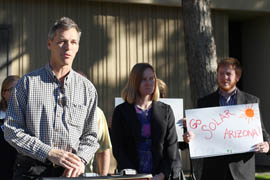Cronkite News has moved to a new home at cronkitenews.azpbs.org. Use this site to search archives from 2011 to May 2015. You can search the new site for current stories.
Rally slams Corporation Commission for solar incentive cuts
PHOENIX – Environmentalists and solar industry leaders rallied Wednesday outside the Arizona Corporation Commission, saying they fear recent cuts to renewable-energy incentives will lead to future reductions that could harm the industry.
“There’s no question they’re doing it calculatedly; they know what they’re doing,” said Randy Dunton, a project developer with Hawkins Design Group, which develops power plants for commercial businesses.
The commission voted 5-0 last week to cancel incentives for large commercial customers’ solar projects in areas served by Arizona Public Service Co. and Tucson Electric Power. It also cut back on incentives for residential customers’ installations.
Those incentives often come in the form of utility rebates that complement federal or state tax credits.
Opponents said cutting incentives will make businesses and homeowners less likely to convert to solar, which in turn will deter solar manufacturers from opening plants here.
They argued that they had little time to voice those concerns before last week’s vote.
Activists also criticized a proposal Commissioner Gary Pierce floated and withdrew last week that would have reduced the renewable-energy procurement requirement for APS. They interpreted the proposal to mean the commission would effectively reduce its standard requiring utilities to obtain 15 percent of their energy from renewable sources by 2025 to 13.35 percent for APS.
Rebecca Wilder, a spokeswoman for the Arizona Corporation Commission, called this interpretation inaccurate. In order to reduce the standard, she said, the commission would have to reopen and revise the 2006 regulations, which she said it has no plans to do.
Utilities are required to meet certain goals each year as they work up to the 15 percent standard, and APS is currently ahead, Wilder said.
“A lot of the discussion was, ‘They’re in overcompliance, we need to ratchet this back,’” she said of last week’s meeting.
Utilities collect a tariff from ratepayers and use the money to purchase renewable energy.
Pierce said he is concerned that as utilities obtain more renewable energy each year to meet the mandate, that will place a growing financial burden on ratepayers, including those who don’t use solar power.
The proposal, Pierce said, was meant as a “wake-up call” for the solar industry.
“I’m not proposing that we need to cut the (renewable-energy standard),” he said. “Another thought I had was, ‘Look, maybe we need to add a year to make it 2026 or 2027.’ At the end of the day we have to recognize, ‘Look, customers have to afford this.’”
Jenna Shaver, an APS spokeswoman, said the utility understands and supports the commission’s decision to cut back on renewable-energy incentives. She said APS is ahead of its mandated goals because of its continued support for solar power.
“The commission is trying to strike a balance when it comes to solar,” Shaver said.
She said Pierce’s proposal, although it was withdrawn, is expected to be brought back later this year and would go into effect next year if it passes.
Katie Radosevic, field associate with Environment Arizona, a statewide environmental advocacy organization that organized the rally, said the group heard about the withdrawal after the rally and was “very relieved.”
But she said last week’s cuts to incentives still stand and there is no guarantee the commission won’t reduce the renewable-energy standard later.
“It’s certainly a fear, but it’s something that we plan to keep them from doing, because solar is a big part of our industry,” she said.







